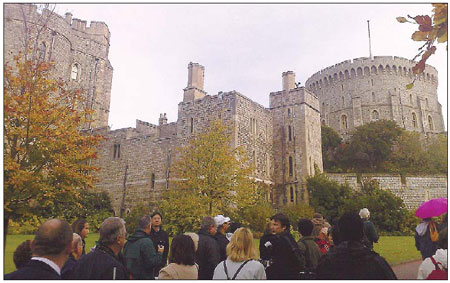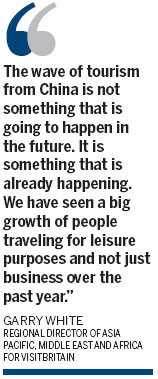Economy
UK opening its arms
By Andrew Moody (China Daily)
Updated: 2010-10-25 09:14
 |
Large Medium Small |
|
 |
|
Chinese travelers among people waiting for entry to Windsor Castle in the English county of Berkshire. It is the largest inhabited castle in the world, dating back to the time of William the Conqueror, and one of the top visitors' attractions in the United Kingdom. [Photo/China Daily] |
Visitor numbers to Great Britain expected to increase by 89 percent

BEIJING - Whether it be Big Ben and the Houses of Parliament, Shakespeare's Stratford-upon-Avon or Edinburgh Castle, Chinese tourists can't get enough of Britain.
The fastest increase in tourism to the UK from any country is from China with the number of visitors expected to increase by a further 89 percent by 2014, according to VisitBritain, the UK government's tourism agency.
Garry White, regional director of Asia Pacific, Middle East and Africa for VisitBritain, based in Singapore, said the growth in Chinese tourists has been something of a phenomenon.
"The wave of tourism from China is not something that is going to happen in the future. It is something that is already happening. We have seen a big growth of people traveling for leisure purposes and not just business over the past year," he said.
The number of Chinese visitors to the UK is set to increase by 27 percent from 100,000 in the year up to August 2009 to 127,000 in the year up to August this year, according to figures yet to be officially released by the International Passenger Survey, part of the UK government's national statistics body.
The same figures reveal the level of Chinese tourism has increased more than six-fold from 16,000 in 1993 to its 2009 level.
Over the same period the number of tourists from the United States to the UK remained static at 2.8 million and those from Japan actually declined by 47 percent from 492,000 to 235,000.
White believes Chinese tourism numbers could soon overtake those of India, a country with close historical ties with the UK.
Last year, 390,000 Indians traveled to Britain, the largest number of any other country in the Asia-Pacific region.
"Our feeling is that China could topple that level within 10 years," he said.
White said there was a need to shift the perception of the UK in China from being solely a business destination to being a place for tourism, a change which already appears to be under way.
"I think the UK is often seen as a place to do business or somewhere to go to study and it is not fully accepted as a place to have a leisure holiday. What we are trying to do is encourage people who go for a business trip to have a leisure extension and also try to encourage more people to visit Britain for a holiday in its own right," he said.
London Olympics
White believes the London Olympics 2012 could prove a catalyst in encouraging more Chinese tourism, with Beijing being the previous host city.
"I think the Beijing-London connection will be very important as well as the media attention that will surround London before, during and after the Games," he said.
White said the tourism body was keen to take advantage of the relatively low value of the British pound, which is making the UK a cheaper destination to anyone from China.
"We are finding the number of visitors who are coming to Britain from Asia-Pacific are finding their holiday cheaper than they thought. Britain is still perceived as an expensive destination but there is a currency advantage at the moment," he said.
White said the aim was to build on the Olympics to reposition the British brand, which many see in terms of the monarchy, red London buses and the famous Scottish tartan.
"We are trying to present the modern cultural as well as the traditional side. One of the challenges in Asia-Pacific generally is getting people to realize that a particular popular culture is, in fact, British," he said.
"In many markets in Asia, people struggle to distinguish a US rock band from an Australian or British one."
He said the Chinese often tend to have a somewhat old fashioned view of Britain.
"I think they may have some stereotypical view of Britain. They might view Britain through the lens of Sherlock Holmes or something like that and the reality might come as something of a surprise," he said.
"The average Chinese visitor has actually been to Britain either once or not at all."
White, who is also a visiting professor of tourism at Strathclyde University in Scotland, has been in his current role in Singapore for three years.
He has worked for VisitBritain, an agency now under the Department for Culture, Media and Sport, for 20 years in Germany, Austria, Switzerland and the United States.
He said marketing the UK to the Chinese is a very different proposition than to someone from Scandinavia.
"With Sweden we have a pretty good data base of visitors and so we can send them some quite complicated messages about what is on offer. They would probably have been to the UK several times and could distinguish between Cornwall and other parts of the country, for example," he said.
"You would also be looking at what you could do in the UK over the next three or four months. With China it is much more long term, often planting seeds for the long-term future."
"We are also trying to improve the service levels available and we are even launching an online application service," he added.
He said VisitBritain was making a concerted effort also to work with China's leading tour operators, particularly those who organize trips to the UK.
"We are running training programs for them as well as workshops and in many cases bringing the top buyers from China to Britain," he added.
White said there was a lot of effort being made into being welcoming to the Chinese, particularly in the hotel industry.
"Many of the London hoteliers are taking the Chinese market extremely seriously and are beginning to recruit more Mandarin speakers so the needs of Chinese visitors can be better catered for," he said.
White added targeting Chinese tourists was a key aim for the agency's tourism efforts.
"The new UK government is prioritizing the BRIC (Brazil, Russia, India and China) markets and that is going to make a big difference in the next few years," he said.



